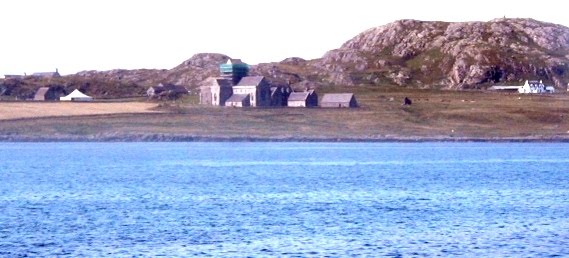When we read of St. Columba's journey to Iona it doesn't come across as a peaceful or joyful choice to "retreat" to the peace of the island as much as a self-imposed prison sentence, which is not far from what it was, resulting from his guilt. That's how the story is told. I always wonder about those stories. Just how true are they, how complete? What realities might be left out of the story of Columba which might detract from the piety of the story we read today, handed down through centuries?I wonder if it was truly self-imposed or if it was accepted by him as an imposed punishment, perhaps to save face, and then Columba made the best of it.
I have nothing at all to base that on but the fact that many stories of saints neglect to include the negative aspects of their personalities or their flaws, struggles or sinfulness. Today we have some wonderful movies about saints, and I am grateful for them and am the first to enjoy and promote them. However, I notice the traits that might make their true humanity clear, or even their slight unorthodoxy are omitted from the movies. I think of the temper of Padre Pio and the riots and deaths that resulted from the passionate response of villagers to the possibility of his being transferred from them. None of that was in the movie that I so love about his life... St. Therese who wanted to be a priest, yet who was ever-faithful to her Church...that desire was not portrayed in her movie, or talked about much in her story. So, what would make it any different for Columba? We like our saints saintly. Sometimes plastic. Columba, in royal line, with temper and human failings could just as easily have been told to get out of Dodge and don't come back. With Grace...his life became that of a saint's.
It seems to me the sinner-turned-saint is a much greater inspiration to the average human than plastic models who never war against inner demons (or outer ones), and who never question spiritual authority, which we all know can be prey to corruption every bit or more than the lowly sheep. Knowing a human has walked the walk of humans, and chosen to respond to the Grace of God offered, and turn toward God ever more determined, even after "backsliding" or sinning again, is much more encouraging to me than not hearing of their weaknesses and struggles with pride, or lust or greed or power. I find it comforting to know I'm among good company when I struggle with the same thing.
Iona, what I call the Vatican of Celtic Christianity, is for me a lighthouse of sorts, a beacon calling my heart to focus more and more on Christ, to live a contemplative Christian life in this world where I live and work and serve. Yet that beacon draws me daily... I have accepted that it is a life's work approaching Iona of the Heart. Bail o Dia ar an Obair or God Bless the Work!

No comments:
Post a Comment